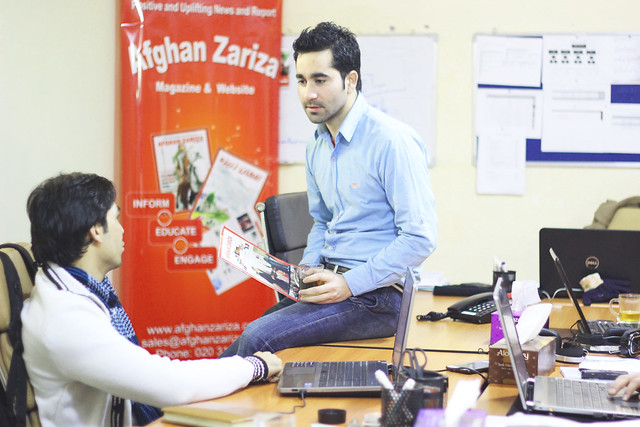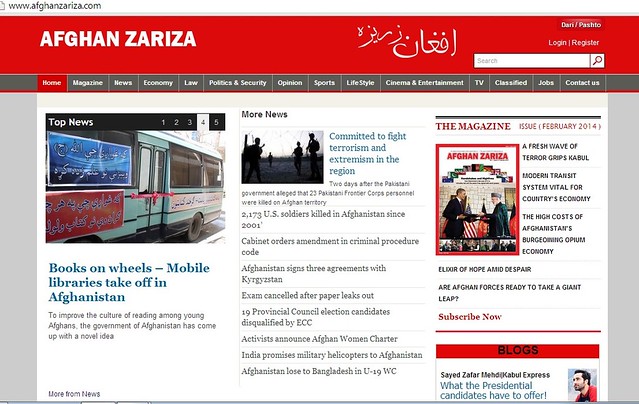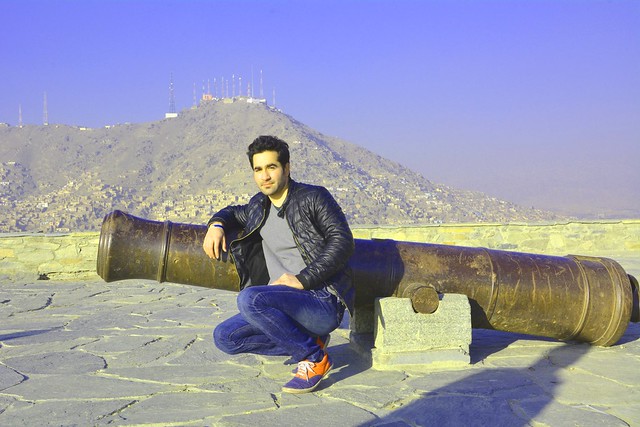By M Reyaz, twoCircles.net,
New Delhi: A very popular Pashto proverb says, “Khpal watan pa har cha Kashmir we (One’s motherland is dearer to everybody like Kashmir.” Kashmir and Afghanistan has natural connections, though now divided by man-made-boundaries.
Originally from Kashmir, Zafar Mehdi is currently based in Kabul and is the Editor of a newly launched monthly magazine Afghan Zariza (Millennium). A graduate in Journalism and Mass Communication from Manipal University, Karnataka, and PG in Print Journalism from YMCA, New Delhi, Zafar later also did masters in Human Rights from Jamia Milia Islamia. Zafar had a stint with Hindustan Times before moving to Kabul, which he thinks is a “fascinating city and much safer than provinces.” Zafar says that when he got an offer to work in Afghanistan, he was excited as he wanted to “see these people in flesh and blood and tell their untold stories.”

In the newsroom, speaking to a reporter. (Pic: Mariam Alimi/ Afghan Zariza)
Growing up in Kashmir in 1990s, Zafar had seen and experienced conflict first hand and hence he feels, he can “relate to Afghans in many ways.” For him, coming to Afghanistan from Delhi was like home-coming, where he considers himself “both an insider and an outsider,” and is not really seen as a khwarijee (foreigner). Four months in Afghanistan, what ‘intrigues’ him the most are the political awareness and hospitality of Afghans. In this Email/GTalk interview with M Reyaz, Zafar talked about his experiences, current situation in Afghanistan and is optimistic about post-2014 scenario and sees “elixir of hope for bright tomorrow.”
Q. You originally come from Kashmir and had been working in Delhi. What made you decide to shift to Kabul?
A. Afghanistan mostly brings to mind the macabre images of death and destruction so it was not an easy decision to make, given the reproachful, doom-and-gloom predictions by naysayers. But, I have always pushed myself to limits and walked the extra mile. So, when opportunity knocked at my door, I seized it. As journalists, we have to throw caution to the wind and run the gauntlet.
Q. Was it only a professional decision, or somewhere a personal call too? I mean, as a Kashmiri growing in 90s you too have seen conflict, does that too play any role in your decision?
A. As a child of conflict who grew up in the turbulent 1990s in Kashmir, I was fully aware of the ominous challenges and risks involved. As Kashmiris, we can relate to Afghans in many ways. We have seen occupation and oppression, and we have also seen resistance and resilience. It was undeniably a professional decision because I have always believed in free and fearless journalism. Afghanistan is one of the most dangerous destinations for journalists and I am an eccentric and maverick person when it comes to journalism. But, at some level, it was also a personal decision because I always had this overwhelming desire to visit Afghanistan and work here. I wanted to see these people in flesh and blood and tell their untold stories to the world.
Q. It’s no doubt a bold decision, but could you elaborate more on the working environment there? How easy or difficult is it for you to work there?
A. When my flight touched down in Kabul on October 28 2013, my heart skipped a beat. There was an excitement and thrill of experiencing new life, meeting new people and exploring new places. But, there was also a feeling of anxiety and disquiet. This city can be so ruthlessly unpredictable. You think it’s peaceful and calm and then suddenly a storm erupts and you are forced to eat your words. Yes, all the talk about Afghanistan bouncing back is no fluff. The war-weary country has embraced change after groping in the dark for decades. But, it continues to be a tinderbox that it has always been and people continue to live on the razor’s edge.
Q. Foreigners working in Kabul often complain about security issues and point out that it becomes very difficult for them to even walk freely on street. How do you cope with those challenges?
A. Kabul is a fascinating city and much safer than provinces like Kandahar, Ghazni, Kunar, Helmand and Khost. Afghan armed forces patrol every street, making it one of the most militarised capital cities in the world. Weekends can be real fun, especially in winters when the rocky landscape is covered with a blanket of snow. But, not everything is hunky dory, as we have seen in recent weeks. A deadly attack on a Lebanese restaurant in my neighbourhood that claimed 21 lives, including 13 foreigners, was a reminder that the war is on. There have been many suicide attacks in various parts of Kabul in recent weeks, which bear eloquent testimony to the fact that peace and normalcy in Afghanistan are a far-fetched dream.
Q. Tell us more about the magazine you are working for – Afghan Zariza?
A. It is a labour of love and birth of a dream. The first-of-its-kind news and current affairs magazine from Afghanistan that seeks to redefine journalism in this war-ravaged country. Most of the news flowing out of Afghanistan is based on half-truths, fabrications and propaganda. Our aim is to give insider’s perspective with more clarity and precision to both Afghan and international readers. We wish to become the voice of ordinary Afghans and tell their stories to the world.

Screenshot of Afghan Zariza
Q. Who is behind the project? And what mandate does it have?
A. It is totally owned and run by Afghans, the first such independent initiative in print media here. We do not wish to become mouthpieces or lapdogs. We are not here to please anyone. We believe the free and independent media is the watchdog of society, custodian of public interest and a stimulus of political and social change. Our guiding principle is to inform, educate and engage.
Q. during Taliban, media industry – like most other industries – had almost collapsed, and today Afghanistan has a vibrant media environment, with to over 65 TV channels, 174 radio and about 800 publications. Could you elaborate more on the media situation there?
A. Media in Afghanistan is a saving grace. A survey conducted by Roshan, the largest telecom company in Afghanistan, revealed that 60 percent Afghans watch television regularly and 95 percent listen to radio regularly.
The print media industry is not as robust as electronic media, but it is slowly and steadily getting there. Afghan Zariza is filling that vacuum. The prime factors that have led to this change are Afghan Constitution drafted in 1964 that gives right to freedom of expression, the magnanimous political leadership that has allowed media to flourish and the burgeoning young population of country.
Q. The number of media houses certainly has gone up, but how free are they as most of them are either supported by international aid agencies or political leaders/former warlords?
A. There is certainly no pressure or bullying from the Afghan government but it is true most of these short-term, project-based news outlets survive and sustain only because of foreign funds. And, when you are funded, you are bound to compromise your integrity and ethics. It happens with most of the news organisations here, as there are many vested interests ready to splurge their money to get good press.
Q. An in you assessment, how do you foresee Afghanistan post 2014, that is after the elections and NATO withdrawal?
A. That is a really important question; will the country descend into chaos or emerge stronger after 2014. There is certainly a lingering fear that the withdrawal of International forces will not only create economic, political and social impediments for Afghanistan, but may also take the country back into the dark days of civil war and social unrest. That is how doomsayers look at it. I don’t necessarily agree with them. I think the country has come a long way and people have grown weary of the endless war. Afghan security forces are also well-trained and well-equipped to take over now. Looking at the bigger picture, I see an elixir of hope for bright tomorrow.
Q. Politics aside, it’s been few months in Afghanistan, how is the new host treating you?
A. It has been 4 months to be precise. I have conquered all my fears and it feels like home now. This is a beautiful country with intriguing culture, sumptuous food and amazingly warm people. Afghans have always been famous for their hospitality, and you have to be here to experience that.

Editor of Afghan Zariza Zafar Mehdi on a weekend trip to a fort (Pic: Naimatullah Rawan).
Q. I remember when a bomb exploded in Kabul, you wrote on FB that you have seen worse, obviously referring to Kashmir in 90s. Do you think you can understand Afghan issues better, for in many ways you are both an insider and an outsider? I mean you are not as alien as say American. Moreover you yourself come from a conflict zone at the same time you are not a native…
A. Those who grew up in the 1990s of Kashmir obviously saw the worst. I have seen my people being killed, tortured and kidnapped and those horrifying memories will always haunt me. That is how an irreverent rebel in me was born. So, coming to Afghanistan from Delhi was like home-coming. I was both an insider and an outsider and thankfully I was not treated as a khwarijee (foreigner).
Q. My last question, despite hectic schedule, conflict tension, what keeps you going? If I ask you to tell one (or few) surprises you had in Afghanistan. I mean something – good or bad – that you never expected from this country?
A. Every morning I wake up with new resolutions and bigger dreams. My unflinching faith and never-say-die spirit is what keeps me going. I consider myself a rookie in this field, so I always strive to do better. The two things that surprised me were:
1. The hospitality of Pashtuns, who are otherwise infamous across the world for producing Taliban. I have not seen more peace-loving, generous and hospitable people than Pashtuns. They will go out of their way to make sure their guests don’t face any inconvenience.
2. How politically aware Afghans are, thanks to years of war and political uncertainty. They know their politicians; they know who the friend is and who is the enemy; they know who carries out the suicide attacks and who seeks to foment trouble.
Link:
http://www.afghanzariza.com/

